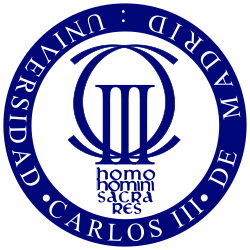 | |
Other name | UC3M |
|---|---|
| Motto | "Homo homini sacra res" |
Motto in English | Man is a sacred thing to man |
| Type | Public university |
| Established | 1989 |
Academic affiliations | UNICA |
| Rector | Ángel Arias Hernández |
Academic staff | 1,987 [1] |
Administrative staff | 681 [2] |
| Students | 18,676 (2012/13) [3] |
| Undergraduates | 15,090 (2012/13) [1] |
| Postgraduates | 2,315 (2012/13) [1] |
| 988 (2012/13) [1] | |
| Location | , , Spain |
| Campus | Urban (3) & Rural (1) |
| Colors | Blue & white |
| Website | uc3m |
 | |
 | |
University Charles III of Madrid (Spanish : Universidad Carlos III de Madrid) (UC3M) is a public university in the Community of Madrid, Spain. Established in 1989, [4] UC3M is an institution with a distinctly international profile. It offers a broad range of master's and bachelor's degree programs in English, and nearly 20% of the student body is made up of international students. It is the first university in Spain and the third in Europe in the number of its students participating in the Erasmus student exchange programs.[ citation needed ]
Contents
- Campuses
- Getafe Campus
- Leganés Campus
- Colmenarejo Campus
- Madrid - Puerta de Toledo Campus
- Rankings
- Education
- Online courses
- Notable alumni
- Notable faculty
- Financing of the university
- Financing projects
- References
- External links
It also holds the highest admission grade requirement in Madrid for several degree programs such as Business, Law, Political Science, Economics, International Studies, Accounting, Journalism or Biomedical Engineering. [5] The university has a strong reputation in business subjects, in particular Economics, for which it is regularly ranked amongst the top 75 institutions worldwide according to the QS World University Rankings . [6] It also ranks among the world's top 200 universities in employability according to the same rankings. [7]
The university's motto is "Homo homini sacra res" ("Man is a sacred thing to man"), a quote adapted from Seneca ( Ad Lucilium XCV:33: "Homo, sacra res homini").
















